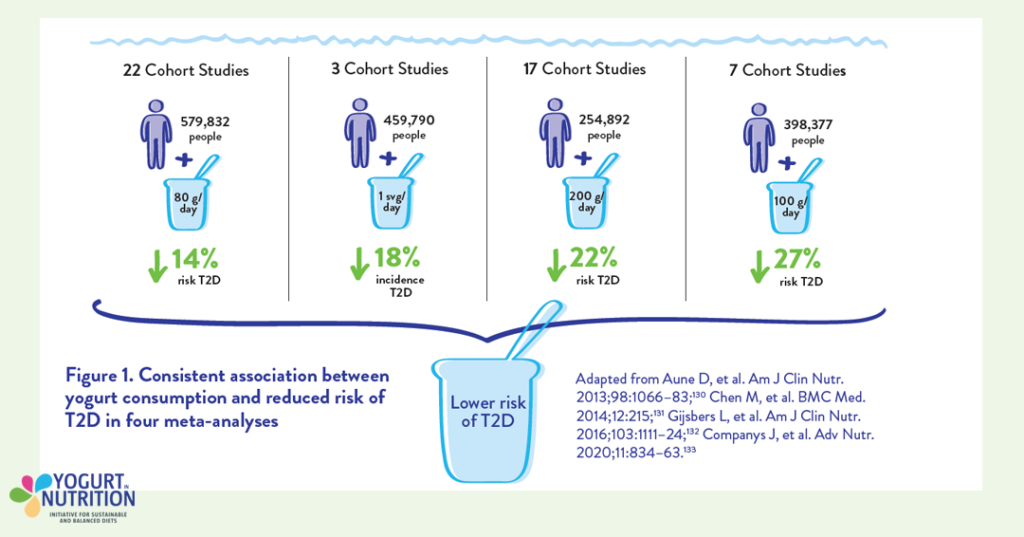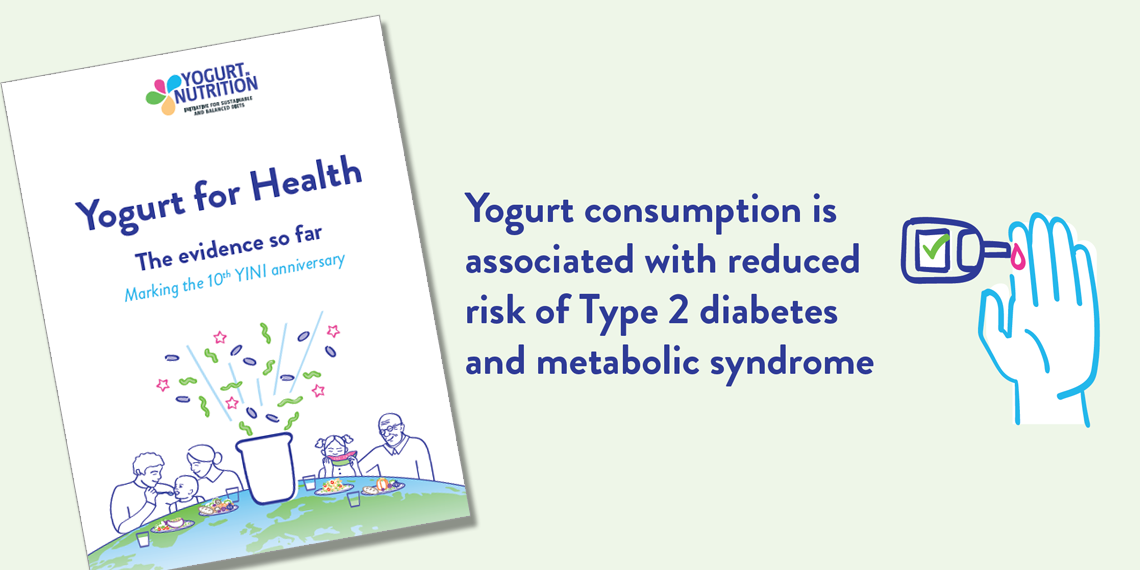On March 1st, 2024, the U.S. Food and Drug Administration (FDA) has approved a qualified health claim regarding the consumption of yogurt and reduced risk of type 2 diabetes (T2D) : “Eating yogurt regularly, at least 2 cups (3 servings) per week, may reduce the risk of type 2 diabetes according to limited scientific evidence.”
Multiple meta-analysis have reported a consistent association between yogurt consumption and reduced risk of type 2 diabetes (T2D).
The association between yogurt consumption and reduced risk of T2D is seen across populations and age groups

Adults
The inverse association between yogurt consumption and T2D risk has been shown in populations in North America, across Europe, the UK, Australia and Japan.
A recent meta-analysis of 14 studies from the USA, UK, Netherlands, Spain, Australia and Japan that included 483,090 individuals (32,896 T2D cases) found a 7% reduction in risk of T2D for every 50 g (~2 ounce) increase in daily yogurt consumption.
Analysis of dietary habits of 192,352 adults in the USA included in three large prospective cohort studies showed that increasing yogurt consumption by >0.5 servings/day was associated with an 11% lower T2D risk over 4 years.
Chen et al. reported that frequent yogurt intake was consistently and inversely associated with T2D risk in young, middle-aged and elderly adults.
A study of young Canadian people of mean age 20 years concluded that eating yogurt may protect against insulin resistance among those at risk of obesity, independent of lifestyle factors
Children
Among children and teenagers aged 2–18 years in the USA, those who ate at least one serving of yogurt per week had a healthier insulin profile, suggesting a reduced risk for T2D, compared with those who ate yogurt less frequently.
Yogurt eaten by children as a snack has been associated with benefits to metabolic regulation compared with a carbohydrate snack, particularly for blood glucose regulation and insulin response.
Yogurt is associated with reduced risk of pre-diabetes
Studies among large Dutch population cohorts have identified a lower risk of pre-diabetes with increased consumption of fermented dairy products and specifically yogurt.
Higher intake of high-fat yogurt was associated with reduced pre-diabetes and insulin resistance risk over 11 years of follow up.
The association with T2D may be specific to the type of dairy product
Analysis of three large prospective cohort studies involving 192,352 people over 4 years found that replacing dairy products that have a high-fat content, such as cheese, with lower fat dairy, such as yogurt or reduced-fat milk, was associated with a lower risk of T2D.
A Danish study showed that yogurt eaten in place of low- or whole-fat milk was associated with a lower rate of T2D during a median follow-up of 15.3 years in people aged 50–64 years at baseline (11–17% reduction per serving per day substituted).
Replacing carbohydrate-based snacks with yogurt is also associated with reduced risk of T2D
In an elderly Spanish population at high cardiovascular risk followed up for a median of 4.1 years, replacing one serving per day of carbohydrate-based snacks with a daily serving of yogurt was associated with a reduced risk of T2D.
Similarly, a UK study found that substituting yogurt in place of potato-based snacks was associated with a 47% reduced risk of T2D in people aged 40–79 years who were followed up for 11 years.
“Strong evidence shows that regular yogurt consumption is associated with reduced risk of Type 2 diabetes, prevention of metabolic syndrome and improved cardiovascular risk profile in the general population.””
Yogurt may reduce the risk of metabolic syndrome
Several studies report a beneficial effect associated with yogurt consumption on prevention of metabolic syndrome (MetS) and improved cardiometabolic risk profile in the general population. In a meta-analysis of prospective cohort studies, yogurt intake was associated with a 20% reduction in risk of MetS development.
How might yogurt reduce T2D risk?
Several mechanisms may explain the association between yogurt consumption and reduced T2D risk.
- People who eat yogurt are less likely than those who don’t eat yogurt to have unhealthy lifestyles that are linked to increased risk of T2D
- Yogurt is a low glycaemic index food, suggesting that it does not cause a spike in blood glucose levels after a meal.
- Yogurt consumers have lower plasma insulin and C-peptide concentrations in response to oral glucose, and exhibit a better metabolic profile compared with non-consumers.
- Live bacteria in yogurt can improve the composition of the gut microbiota and this may help reduce inflammation, which is linked to T2D.
- The risk of T2D has been shown to decrease by 7% for each 10 μg increase in dietary vitamin K2. Whole-fat yogurt contains up to 28 μg of vitamin K2 per 100 g (~4 ounce) serving.
Increased yogurt consumption might reduce healthcare costs
Researchers analysing UK data have predicted that if the adult population increased the amount of yogurt they ate by one serving per day, they could generate savings to the National Health Service of £140 million over 5 years through reductions in the incidence of T2D.
References
- Slurink IAL, Voortman T, Ochoa-Rosales C, et al. Dairy product consumption in relation to incident prediabetes and longitudinal insulin resistance in the Rotterdam study. Nutrients. 2022;14:415.
- Zhu Y, Wang H, Hollis JH, et al. The associations between yogurt consumption, diet quality, and metabolic profiles in children in the USA. Eur J Nutr. 2015;54:543–50.
- Tremblay A, Panahi S. Yogurt consumption as a signature of a healthy diet and lifestyle. J Nutr. 2017;147:1476S–80S
- Wen L, Duffy A. Factors influencing the gut microbiota, inflammation, and type 2 diabetes. J Nutr. 2017;147:1468S–75S.
- Chen Y, Feng R, Yang X, et al. Yogurt improves insulin resistance and liver fat in obese women with nonalcoholic fatty liver disease and metabolic syndrome: a randomized controlled trial. Am J Clin Nutr. 2019;109:1611–9.
- Feng Y, Zhao Y, Liu J, et al. Consumption of dairy products and the risk of overweight or obesity, hypertension, and type 2 diabetes mellitus: a dose-response meta-analysis and systematic review of cohort studies. Adv Nutr. 2022;13:2165–79.
- Panahi S, Doyon CY, Despres JP, et al. Yogurt consumption, body composition, and metabolic health in the Québec Family Study. Eur J Nutr. 2018;57:1591–1603.
- Aune D, Norat T, Romundstad P, et al. Dairy products and the risk of type 2 diabetes: a systematic review and dose response meta-analysis of cohort studies. Am J Clin Nutr. 2013;98:1066–83.
- Chen M, Sun Q, Giovannucci E, et al. Dairy consumption and risk of type 2 diabetes: 3 cohorts of US adults and an updated meta-analysis. BMC Med. 2014;12:215.
- Gijsbers L, Ding EL, Malik VS, et al. Consumption of dairy foods and diabetes incidence: a dose-response metaanalysis of observational studies. Am J Clin Nutr. 2016;103:1111–24.
- Companys J, Pla-Pagà L, Calderón-Pérez L, et al. Fermented dairy products, probiotic supplementation, and cardiometabolic diseases: a systematic review and meta-analysis. Adv Nutr. 2020;11:834–63.
- Díaz-López A, Bulló M, Martínez-González MA, et al. Dairy product consumption and risk of type 2 diabetes in an elderly Spanish Mediterranean population at high cardiovascular risk. Eur J Nutr. 2016;55:349–60.
- O’Connor LM, Lentjes MA, Luben RN, et al. Dietary dairy product intake and incident type 2 diabetes: a prospective study using dietary data from a 7-day food diary. Diabetologia. 2014;57:909–17.
- Forouhi NG. Association between consumption of dairy products and incident type 2 diabetes – insights from the European Prospective Investigation into Cancer study. Nutr Rev. 2015;73(Suppl 1):15–22.
- Drouin-Chartier JP, Li Y, Ardisson Korat AV, et al. Changes in dairy product consumption and risk of type 2 diabetes: results from 3 large prospective cohorts of US men and women. Am J Clin Nutr. 2019;110:1201–12.
- Drouin-Chartier JP, Hernández-Alonso P, Guasch-Ferré M, et al. Dairy consumption, plasma metabolites, and risk of type 2 diabetes. Am J Clin Nutr. 2021;114:163–74.
- Slurink IAL, den Braver NR, Rutters F, et al. Dairy product consumption and incident prediabetes in Dutch middle‑aged adults: the Hoorn Studies prospective cohort. Eur J Nutr. 2022;61:183–96.
- Brouwer-Brolsma EM, Sluik D, Singh-Povel CM, et al. Dairy product consumption is associated with pre-diabetes and newly diagnosed type 2 diabetes in the Lifelines Cohort Study. Br J Nutr. 2018;119:442–55.
- Ibsen DB, Laursen ASD, Lauritzen L, et al. Substitutions between dairy product subgroups and risk of type 2 diabetes: the Danish Diet, Cancer and Health cohort. Br J Nutr. 2017;118:989–97.
- Wu Y, Ding Y, Tanaka Y, et al. Risk factors contributing to type 2 diabetes and recent advances in the treatment and prevention. Int J Med Sci. 2014;11:118–200.
- Wolever TM. Yogurt is a low-glycemic index food. J Nutr. 2017;147:1462S–7S.
- Pei R, DiMarco DM, Putt KK, et al. Low-fat yogurt consumption reduces biomarkers of chronic inflammation and inhibits markers of endotoxin exposure in healthy premenopausal women: a randomised controlled trial. Br J Nutr. 2017;118:1043–51.
- Beulens JW, van der A DL, Grobbee DE, et al. Dietary phylloquinone and menaquinones intakes and risk of type 2 diabetes. Diabetes Care. 2010;33:1699–705.
- Walther B, Karl JP, Booth SL, et al. Menaquinones, bacteria, and the food supply: the relevance of dairy and fermented food products to vitamin K requirements. Adv Nutr. 2013;4:463–73



